Recently, I had the opportunity to have a conversation with photographer Noah Abrams. I talked with him about his work, some ongoing projects, and his day to day life. Noah grew up skateboarding in Columbus, Ohio. He also mentioned to me that he never truly considered photography as a career until later into his 20's, although he had dabbled with it for years throughout high school and college. To learn all of this, I began with a question that many people have for working photographers: where did your initial interest in photography come from?
Noah answered by saying that he grew up skateboarding and was always looking through skateboarding magazines. He told me that he thinks skateboarders kind of look at things differently. That was his first introduction to looking at real photography.
It kind of grew out of that. At some point you realize that you’ll never become Tony Hawk so you look for other creative outlets. I would go out and take pictures with my mom’s camera or video with a camera. I cut the images out and put them on a wall. It wasn’t really until I got into college that I picked up a camera and really tried to figure things out. I wasn’t that kid in high school that was always taking photos and hanging out in the darkroom. I must have been a junior in college when I really started shooting. My junior year I bought a camera and just started shooting. I spent my junior year abroad and I was in Europe for half of the year and then India, Nepal, and Tibet for the other half of the year and just shot dozens and dozens and dozens of rolls. I got those images back, and some of them were pretty good and that’s the point where it was really just something to do. I wasn’t like, “Oh, I want to be a photographer.” I come from Columbus and I think for me the only photographer I knew growing up was the guy that shot everyone’s bar mitzvahs and the wedding photographer. That was the only example of a professional photographer that I had. I had a bunch of other jobs; I didn’t major in photography, I majored in political science. I just always took pictures. I moved back to LA when I was 25 and was dating a musician. I started taking pictures of her and taking pictures of her friends bands and again, I was working other jobs. It kind of just grew out of that really. I shot for fun. It wasn’t until we broke up when I was almost thirty that I started to look at it seriously. I had a job working at a talent agency working as an assistant, and I would work there from 7am to 8pm and then go shoot bands at night and then come back the next day and drop off my film at lunch and started to grow my book. Again, it was never like “I’m gonna grow my book because I want to be a photographer”, it was just because I liked shooting. I shot whatever I could. Finally, you get to a point where you think this is really what you want to do. Then, I reached out to a handful of photographers looking to assist, and fortunately, the first person I called was really nice and spent a half an hour talking about how they hire assistants. Unfortunately, she was New York based and I was in LA. That was in October. I think it was in February that she reached out and called and asked what I was doing, and she said that she had a job in LA. I used all of my vacation and sick days at the talent agency to go work for her. Working for her and being on set with her was really the last piece of the puzzle. It was the first time that I had been on a professional set. Seeing all of the talent and models, I thought, “That’s it. That’s what I want to do.” From there I saved money for the next six months to leave the talent agency and go out on my own."


Knowing more of his background and his foray into photography, I was curious as to what his next steps were. I asked him if he had ever experimented with genres other and than music and portraiture. He replied by saying that it never really interested him or caught his attention.
I don’t take nature photos and I don’t shoot still life. It just doesn’t interest me. I take pictures of people and I love documenting people. I know Ansel Adams is a master, but to me that stuff is really boring. People living life and performing is the stuff that I’ve always liked. I was never into still life or shooting nature or shooting stars, you know? It was never stuff that I was drawn to.
I thought it was interesting he mentioned Ansel Adams as boring, a master of his discipline and inspiration to many. So did anyone inspire him or help him find his unique style?
Honestly, no. I’m such an anomaly. Well, I don’t know that I can say I’m an anomaly, but I just know that I’m not the guy pouring over photo books and geeking out on other photographers. I maybe follow four photographers on Instagram and all of them are friends. I’ve always just shot what I wanted to shoot. The best way to form your own style is to shoot it the way you want to see it. There are a handful of photographers whose work I enjoy looking at like Danny Lyon and Garry Winogrand, but because I’m not a trained photographer, I’m more inspired by other art forms, like music, writing and books. I don’t look at other photographers work and think “oh I want to shoot that”. It’s just definitely not what drives me.

I understood his point of view. I wanted to change gears a little and discuss how he had come to create a few images and started on some of his bigger projects. I asked him how he ended up shooting the US Olympic team and Johnny Depp. We also touched on how jobs have started to come to him.
I can’t say one way or another why I got hired. I take care of my clients. For the Olympic thing, it came about because I was approached by them because they knew my music work and my work in race car driving. So, if you look at my music work and you look at my race car work, they’re two completely different subjects and styles, but I think there’s a style that flows throughout each. With the Olympics, I bid on it and gave a creative pitch on how I wanted to do it, and then that’s what they wanted. In four years, they could want something completely different. The Johnny Depp thing came about because I was there shooting Ryan Adams and Butch Walker, and Johnny happened to stop by. At this point, my still photography business is an incoming call business. People are calling me because they want me to shoot something. Occasionally, there is an artist that I really want to shoot because I’m interested in what they’re doing and I’ll pitch it to their manager or their publicist. I’m fortunate that I’m in a point in my career that a lot of the jobs I get have come from jobs I’ve done previously. Usually it’s one degree of separation.
 He mentioned having worked with bands like U2 and The Black Keys. With big name artists like that, I figured that there were some tough situations or schedules that had to be worked around. I posed the question: what do you think has been your most challenging shoot?
He mentioned having worked with bands like U2 and The Black Keys. With big name artists like that, I figured that there were some tough situations or schedules that had to be worked around. I posed the question: what do you think has been your most challenging shoot?
He said that it’s sort of cliché, but that he approaches every job like it’s his first job. He takes the work very seriously, but doesn't take himself seriously at all. He mentions that he has a lot of respect for the craft.
I’ve become so accustomed to a publicist or a manager saying: “Ok, you have five minutes in a hotel room or backstage,” that I’ve gotten really good at getting the shot in five minutes. When they say that we have an entire day of shooting, I get overwhelmed because I’m so used to having to do it in five minutes that I think, “We have eight hours? How do I fill those eight hours?” There is always an opportunity to learn.
With that, I wondered if there were any shoots that he felt were particularly rewarding or memorable. That or any specific shoot that he had walked away from feeling like he had hit a milestone or just had a moment that was really a once in a lifetime experience.
When he looks at his body of work, he mentioned that he feels the most proud of his ongoing projects because they allow him to really connect with his subjects.
When I look at my body of work and the stuff that I’m most proud of and the stuff that means the most to me... I’m so immensely grateful for being able to create things everyday. Everything is different. As far as memorable shoots, I really enjoy having the opportunity to build a body of work with a specific subject, so I spent three or four years shooting IndyCar racing. Thousands of images came out of that. Building a body of work around one subject is exciting; that feels special. More and more, those are the projects that I get really excited to shoot. The Olympic thing was rad because it was like seven straight days of shooting, but when I have an opportunity to build that body of work, that’s exciting.


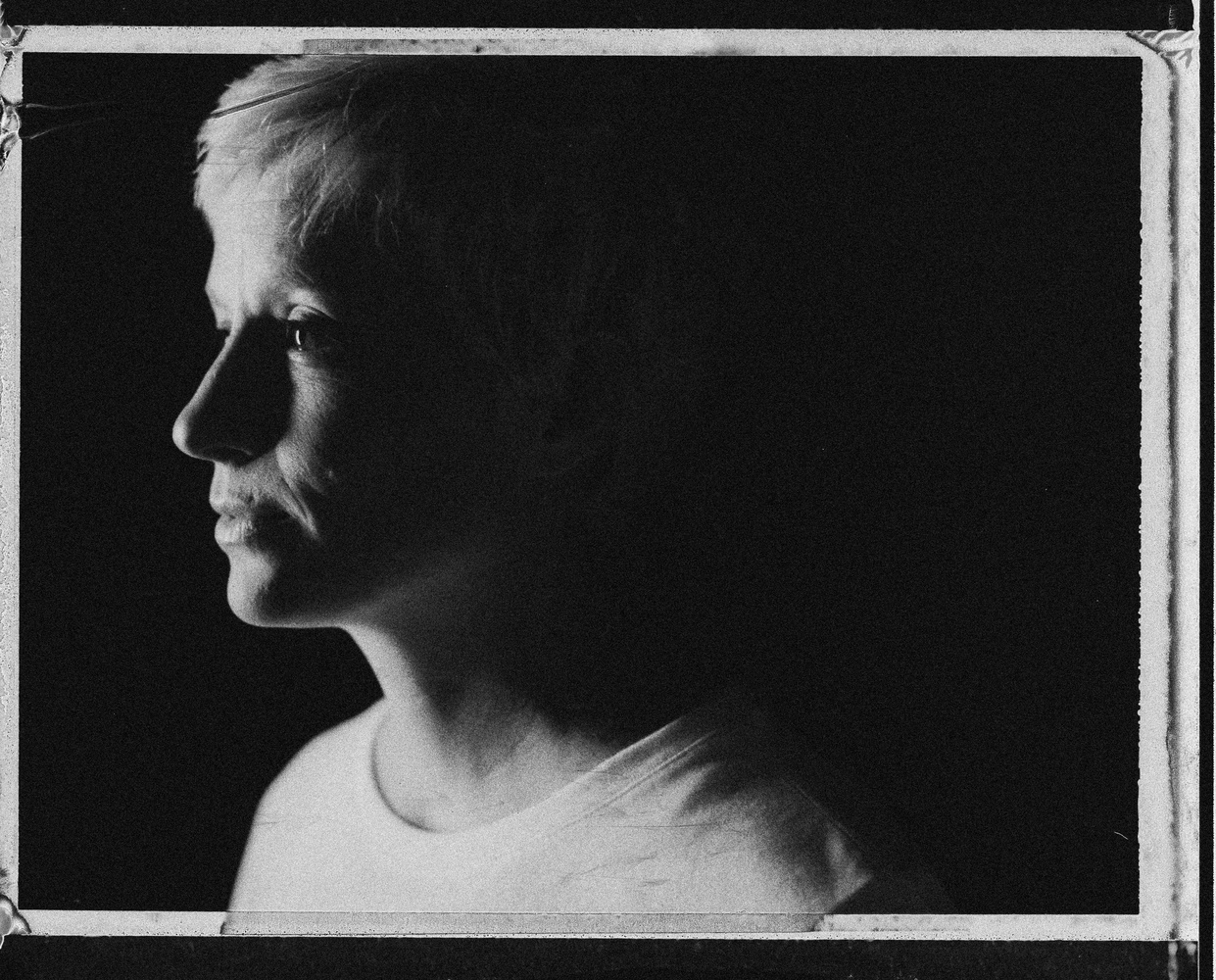



The Black Keys have been the subject of one of his biggest bodies of work. Being a fan of their music myself, I wanted to know how that project came to be. He told me that it started during his time at the talent agency. He had obtained clearance to photograph one of their shows. The management saw that he wasn't messing around and it became a repeat gig.
I shot them whenever they came to town. It just felt really organic. We just got along really well and I became friends with Pat and Dan, and I usually shoot them whenever I see them or whenever we’re in the same city. I ended up directing a documentary about them.
He told me that IndyCar came about in a similar fashion. Because they had seen his music work, they hired him to shoot one race and it became a seasonal deal after that. 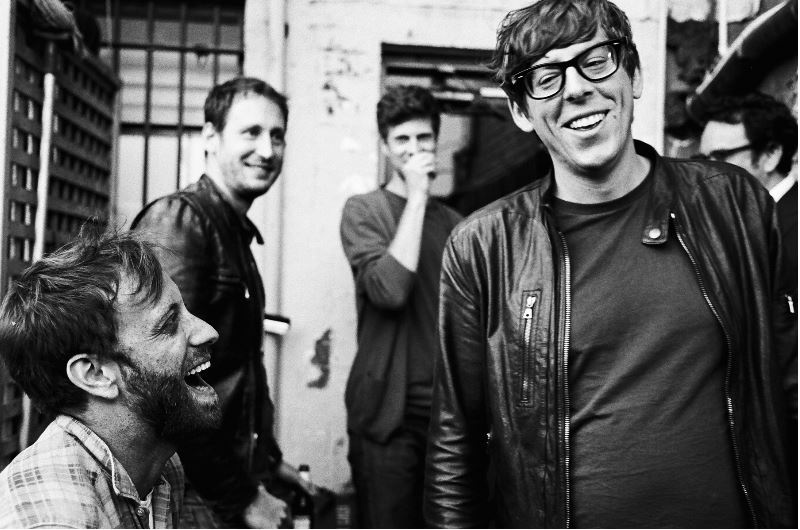
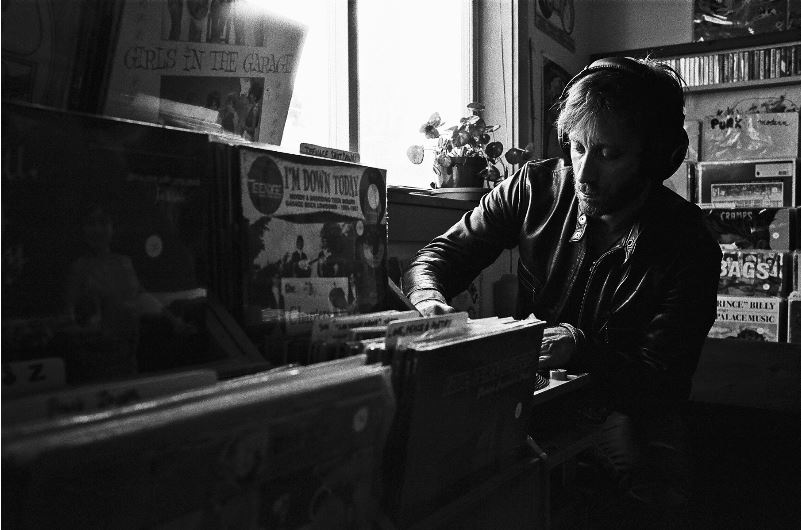
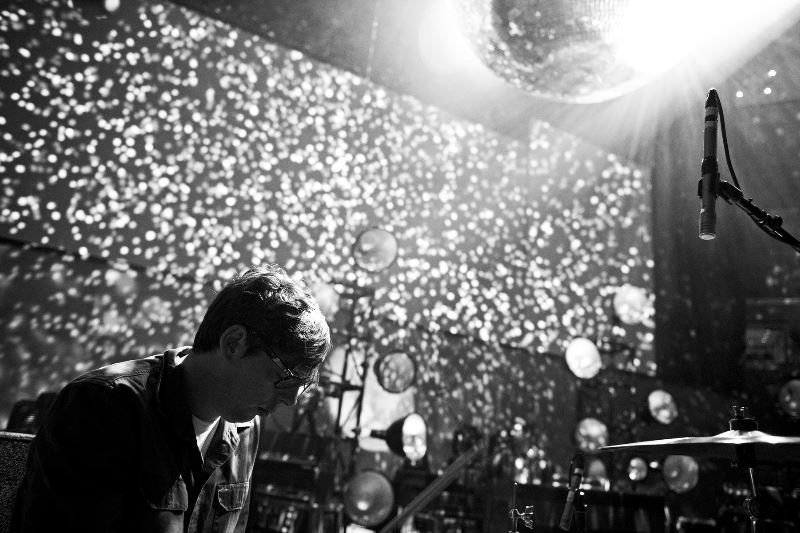
Getting to see the side of his life that involved big projects and extended amounts of time shooting certain subjects, I was curious as to what he did when he wasn't on the road or out of town for work. "When you’re home in LA, what is your day to day like?"
Noah has two sides of his business: there’s Noah Abrams Studio and then there’s A-Team Films which is his motion picture side. Noah said that he hosts a television show and directs motion pictures, tv shows and documentaries, feature films and commercials.
I’m working on a second documentary right now. I always have something going on, so when I’m home, I’m usually prepping for something or in the editing suite working on edits for something. It doesn’t feel real, because I get to work on everything that I want to work on. It’s exciting, because there isn’t a lot of downtime. I got back from Paris last night and I’m at a studio right now talking about a project, and then I’ll go back to write a pitch for another project. When I do have days off, I’m almost always on a motorcycle or hanging out with friends. It’s definitely hard work, don’t get me wrong. Earlier this year, I worked myself into the hospital, so I’ve learned to have to balance it out.
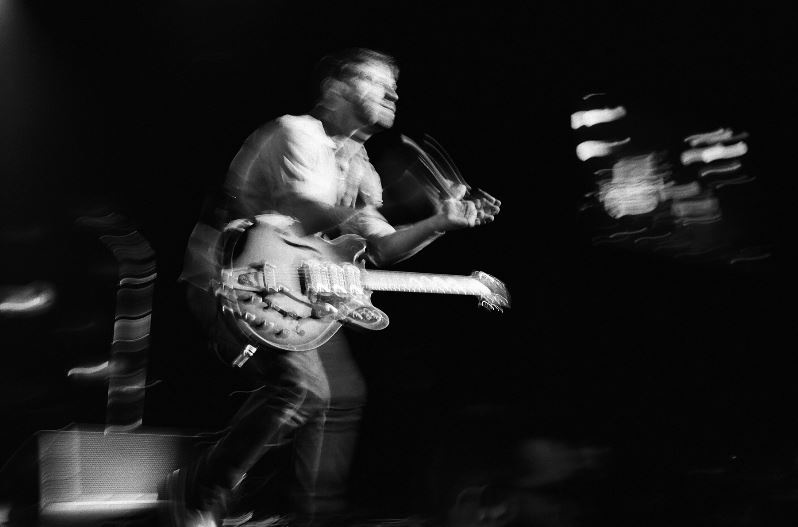

Changing direction, I wanted to know what kind of gear he works with. I understand that the gear doesn't make the image, but it's interesting to see what tools fellow artists are working with. Knowing that Noah works with a lot of film, I figured there were various formats involved as well.
The only digital camera that Noah owns is his iPhone. He says it comes from his experience with film and having grown up shooting film.
That’s not like an arrogant thing, I just don’t like digital cameras. It’s how I grew up and how I learned. I’m more comfortable shooting film. That’s not to say that I don’t have to shoot digital for jobs sometimes. There are some jobs where shooting only film would be impossible.
His camera bag is pretty simple: a Leica MP that he has with him every day and sees use on almost every job. Lens-wise, 95% of the time it’s ths 35mm Summicron. Sometimes he uses use a 50mm. A lot of the Polaroid work that he does is on an old Konica.
I like it because its minimum focus distance is much less than any of the comparable ones. The Konica is like a foot and a half so I can shoot some really cool close-ups. That being said, that camera is a pain in the ass because it always breaks.
He mentions other cameras like the cult classic Diana, and a widelux f/8 as well as an Olympus Pen half frame. 4x5 is a format that he has experience with as well. Due to time constraints and convenience, he says it doesn't show up much in his work.
[4x5] it’s very methodical and relaxing to shoot. I never shoot it because I just don’t have time. In general, I shoot, format wise, 35mm and medium format film. I used to shoot with a Hasselblad, but it was just too heavy. I injured my back in a car accident last year, so I’m all about staying light and portable, which is why I like the Leica. I used to have a ton of Canon digital gear and strobes, but I don’t have the patience for it anymore. At this point, it’s just natural light and either Tri-X or Delta 3200, and that’s it. I still have a bunch of Polaroid 665 that I use.

Noah seems to have found his niche in regards to what he shoots and what he wants to create. Having been working for many years and gathering experience in the industry, I figured he may have some wise words for the beginner. Photography can be a scary business to get started in due to so much of it being freelance. Learning from people that have been through it will provide a lot of insight and can keep you from making detrimental mistakes.
He started his answer by saying that you have to shoot what you want to shoot.
Don’t follow the trends; it’s just a dead end street.
He values developing a unique style that isn't sort a cookie cutter way of shooting.
I feel bad for people starting out now because there’s a lot of competition, and there are a lot of people that are really good at marketing their work. They’re all over Instagram and they have 35K followers, but there’s no style. Don’t become a photographer because you want to be rich, don’t become a photographer because you want to be cool.
He told me that people shouldn't worry about how it’s perceived. The reality is we get paid to do something that we love to do. Noah encourages photographers to get rid of whatever ego they may have.
Be grateful, have zero ego, and do it because you love it. You’re not special, you’re extremely lucky. If you're in it for the right reasons, you’ll figure out a way to make it happen. Another thing to keep in mind, because you are being paid to create and you are so lucky, you’re such a minority. Don’t be a dick. Just be kind to people. Take care of your clients and the people that work for you. Be kind and good things will happen.



I think those are some wise words. The way that social media and the internet have driven photography has changed things a lot in the last five or ten years. It's no longer about seeing work in or on a magazine as much as it is on Instagram or a web based ad campaign. This drastically changes the scape of the industry as everyone has a platform to share and have their work seen by the world. The influence of what is a 'popular style' is far greater now than at the dawn of the digital age when social media was in its infancy. I asked him then if he had any closing thoughts on the topic of advice and opinions on the industry.
I would say don’t work for free. If you don’t value your work, no one is going to. If you’re starting out, you can’t be like, “Ok, I need $10,000 a day.” But there needs to be a value exchange. Also, take a business class. Go to your local community college and take a class so that you understand dollars and cents. I’ve hired people right out of photo school that have way more technical knowledge than I do, but they can’t do a budget. So they’re never going to make it. They’ll always be someone's assistant if they can’t run a business.

Also, always shoot. Never stop shooting.
A huge thanks goes out to Noah Abrams for taking the time to have the conversation and to Dakota Mullins for helping to put this all together.
Noah Abrams' work can be found at his website.
All images used with permission.







Great interview, and amazing shots. Makes me feel bad about my own lack of style though!
I didn't know Noah's work before this but I really enjoyed the article and getting to know a little about the man. He seems like a really nice guy with a really grounded approach, doing what he loves. Thanks for sharing his story.
Powerful images and really interesting interview.
Never heard of him until now. My loss.